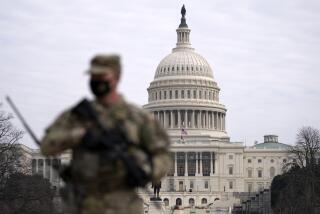House Calls for Explanation of U.S. Gulf Plans
- Share via
WASHINGTON — The House, pressuring the White House to justify its embattled policy in the Persian Gulf, voted 302 to 105 on Tuesday to require Administration officials to explain their plans in the war-torn region.
The action reflected heightened concerns about the risk involved in plans to expand the United States’ military presence in the gulf, particularly after the Iraqi attack on the Navy frigate Stark killed 37 American sailors. In addition, the resolution indicated that Congress may not idly stand by as this policy is carried out.
“Once the reports are received, it will be possible to evaluate Administration policies,” House Speaker Jim Wright (D-Tex.) said. “Congress is unwilling to buy a pig in a poke.”
In the Senate, which adopted a similar resolution last week, members of both parties called for the invocation of the War Powers Resolution to block Administration plans to use U.S. naval forces to escort Kuwaiti oil tankers that are threatened with Iranian attack. The War Powers Resolution requires the Administration to consult with Congress before exposing U.S. forces to “imminent hostilities” and gives Congress an opportunity to vote down such plans.
Administration officials, who have pledged to abide by the congressional resolutions, say that the convoys are necessary to keep open shipping lanes vital to the world’s oil supplies and to prevent the Soviet Union--which also plans to protect Kuwaiti ships--from gaining too much influence in the region.
But congressional critics say that the Administration is being stampeded into taking sides in the 6 1/2-year war between Iran and Iraq, which is an ally of Kuwait.
“The Kuwaitis have very skillfully played the United States and the Soviet Union off against each other, not because of the flow of oil but in order to get us into that war,” Sen. Dale Bumpers (D-Ark.). said in an interview.
“We’re literally throwing the gauntlet down” to Iran, Bumpers said, adding that “this is one of the most ominous situations that has occurred since we got into Vietnam.”
‘Not a Belligerent’
However, Pentagon spokesman Robert B. Sims insisted at a briefing Tuesday that the United States is not taking sides. “Kuwait is not a belligerent in the war; it is neutral in the war,” Sims said. “We do not see this as in any way involving us with a belligerent.”
The House resolution would require within a week a report describing “the threats to American forces” and to Kuwaiti ships, the rules under which U.S. forces will operate and any “cooperative arrangements” being developed with American allies.
The overwhelming vote on the measure was taken only after strenuous efforts by the House leadership quelled a revolt that earlier in the day had led the House Foreign Affairs Committee to kill the proposal.
Opposition came both from conservatives, who wish to give President Reagan a free hand in the gulf, and liberals, who feared that once the Administration submits its reports to Congress, the resolution would be viewed as a tacit endorsement of the plans.
But House Majority Leader Thomas S. Foley (D-Wash.) insisted: “The resolution does not, repeat not, give permission for the Administration to do anything. It does not substitute for the War Powers Act” and is merely a “first step.”
Rep. Toby Roth (R-Wis.) retorted: “If Congress needs information, let Congress make a telephone call. This resolution puts congressional fingerprints on our course of action.”
Critics of the gulf policy question “both the (Administration’s) competence and the means” it plans to use in the region, California Rep. Mel Levine (D-Santa Monica) said.
Weinberger, Saudis to Meet
Pentagon officials, meanwhile, disclosed that Defense Secretary Caspar W. Weinberger will meet this week with his Saudi Arabian counterpart to discuss the gulf situation.
Weinberger is expected to use his talks in Nice, France, with the Saudi defense minister, Prince Sultan ibn Abdulaziz, to discuss the reported U.S. desire to use Saudi airfields to base U.S. fighters or tanker planes to help support the naval escorts. Saudi Arabia is also allied with Iraq.
Sims would not predict when U.S. escorts of Kuwaiti tankers would begin but disclosed that a Navy guided-missile cruiser, the Fox, had been sent into the gulf for an indefinite stay. The Fox would replace the Stark, which Sims said will return to the United States when temporary repairs are completed in about 30 days. Three more U.S. warships are en route to the gulf.
In addition, Sims said that U.S. and Iraqi officials have worked out procedures to avoid a repeat of the missile attack on the Stark, which the Baghdad government insists was a mistake, but he declined to give details.
More to Read
Get the L.A. Times Politics newsletter
Deeply reported insights into legislation, politics and policy from Sacramento, Washington and beyond. In your inbox twice per week.
You may occasionally receive promotional content from the Los Angeles Times.











